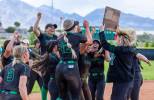Card-check opponents rally for state amendment
The possible passage of a new federal law next year has opponents scrambling to tighten state constitutions, including Nevada's.
The Washington, D.C.-based business-backed coalition Save Our Secret Ballot launched a national initiative on Tuesday to tighten voters' rights in state constitutions in anticipation of congressional approval of the Employee Free Choice Act, which would allow card checks for union representation sometime next year.
The efforts will start in Nevada, Utah, Arizona, Arkansas and Missouri, with the campaign spreading to other states in the coming months, according to Ernest Istook, the coalition's chairman and a former congressman from Oklahoma.
"We're acting now to create state constitutional guarantees for secret ballots," said Istook, who is a member of the conservative Heritage Foundation. "We want to avoid the efforts to create a bypass mechanism that can remove a right to secret ballots."
The group is proposing a 47-word amendment to state constitutions that guarantees the secret ballot in union representation elections where "state or federal law requires elections for public office or public votes on initiatives or referenda, or designations or authorizations of employee representation."
The language was authored by Clint Bolick, director of the Goldwater Institute's Scharf-Norton Center for Constitutional Litigation, which has said it will defend the legality of language where challenged.
While some of the organizers are going to work with their states' legislators to have the amendment placed on the state ballots in 2010, Tibi Ellis, the Save Our Secret Ballot's chairwoman in Nevada, said she plans to collect 60,000 signatures to have an initiative before voters.
Ellis said the issue is not a partisan or union issue, but rather it is about the fundamental right to conduct elections by secret ballot, whether for elected office or for labor-organizing efforts.
"Nevada protects the right of a voter by providing a protection of a vote without coercion or intimidation," Ellis said. "We want to make sure any management or employer or other organization will not exert any pressure on any voting process."
Ellis said vague wording already exists in the Nevada Revised Statutes, but it needs to be clarified to include all union elections.
NRS 293.2546 Section 3 reads: "The Legislature hereby declares that each voter has the right to vote without being intimidated, threatened or coerced."
"We all grow up with the assumption that the secret ballot is a right, and it isn't," Ellis said. "And now it's being threatened."
The push for state constitutional amendments guaranteeing secret ballots highlights what is expected to be a big battle between unions and employers in the coming year.
Because employees still could request union elections under federal legislation, the proposed state constitutional amendments may ultimately have little effect, said Josh Goldstein, a spokesman for the union-backed group American Rights at Work.
"They're using this messaging point on the secret ballot to demonize the legislation, but they're neglecting the actual facts," Goldstein said.
Representatives for Culinary Local 226, the area's largest union with 60,000 members, and the Nevada AFL-CIO were not available for comment on Tuesday due to the holiday season.
Unions hope that the support of President-elect Barack Obama and a stronger Democratic majority can help win passage in 2009 of their top priority -- the Employee Free Choice Act. The measure passed the House in 2007 but died in the Senate after a Republican filibuster.
The measure is designed to boost union membership by having employees sign union cards to form unions instead of holding secret ballot elections.
Unions say such elections give employers a chance to pressure their employees against unionization. By contrast, some businesses and the Save Our Secret Ballot group contend that unions will intimidate workers into signing union cards if businesses cannot demand a secret election.
Contact reporter Arnold M. Knightly at aknightly@reviewjournal.com or 702-477-3893. The Associated Press contributed to this report.























